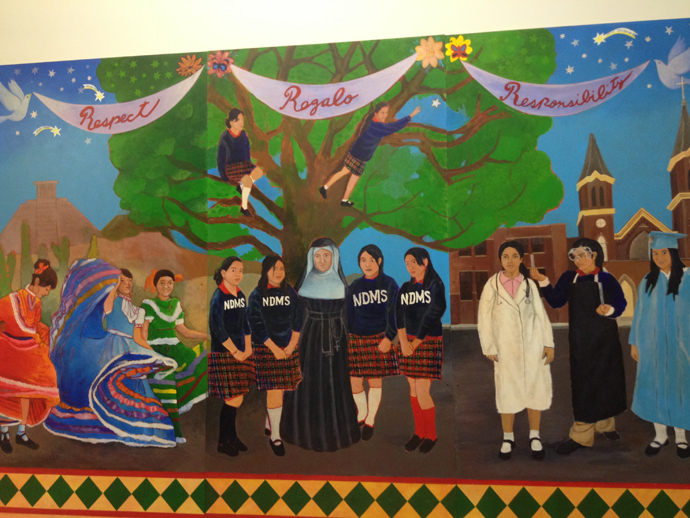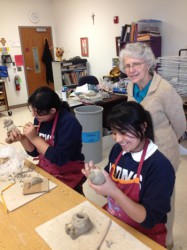All Girls, All Latino
Notre Dame Middle School is a choice school where test scores, until recently, were high.

This mural was created by the NDMS class of 2008 upon their graduation. (Photo by Henry Greening)
There is nothing extravagant about Principal Sister Jean Ellman’s office on the first floor of Notre Dame Middle School. Four bland white walls surround a circular brown table in the middle and a rectangular desk tucked away in a corner. Papers and documents are strewn about, but her room’s decor is not indicative of her mindset. Ellman is calm and collected and knows she is making the right choices for her students.
Notre Dame Middle School, 1420 W. Scott St., is an all-girls, parental-choice school covering grades 5 through 8. Its student body of 147 is made up almost completely of Latino students who come from families below or near the poverty line. The parental-choice program allows students from low-income families to receive free or reduced tuition, as well as a paid-for school lunch. According to Ellman, 90 percent of NDMS students are enrolled there because of the program.
Ellman has involved in education in the Latino community in Milwaukee since 1980 and has been the principal at NDMS for 10 years. Before that she was the principal at NDMS’ brother school, Nativity Jesuit, 1515 South 29th St., for 11 years. Ellman said she runs a tight ship and has high expectations for her students.
“I want to know how the kids are doing and I want the parents to know I’m interested,” Ellman said. “It isn’t just the teacher and the student, it’s all of us. We’re all working together.”

Sister Ellman watches students craft ceramics. (Photo by Henry Greening)
Every incoming student and all students who are behind are required to go to summer school. This allows teachers to evaluate where those students stand academically and help them catch up.
Ellman said one of the most attractive elements of NDMS is its after-school program. From 4-6 p.m. every Monday through Thursday, all students participate in an hour of activities and an hour of study hall. Students can select from about 30 activities, including sports, music, art, dance and sewing. The hour-long study hall allows students to get help with their schoolwork.
“[Study hall] is a big draw for our families because many of our families say, ‘I can’t help my student with homework anymore’ because [the students] are at a level where many of the parents haven’t gone in school,” Ellman said. It also keeps the students under supervision when many of their parents are still at work.
NDMS parents are asked to log 20 hours of service per year at the school and must attend certain events such as parent-teacher conferences. While Ellman said she cannot require parents to attend, she rarely has to hunt parents down to participate.
Ellman calls the school “an eight-year commitment,” because even when students graduate, NDMS continues to work with them. Upon graduation, students are assigned a supervisor who watches their work in high school and makes sure they stay on track so they can eventually get to college.
The Wisconsin Department of Public Instruction reported that in fall 2013, only 35.9 percent of NDMS students were proficient or advanced in math and 14.1 percent in reading. The Wisconsin state averages were at 48.6 and 36.2 percent, respectively, while the average MPS and voucher student scored under 20 percent in both subjects.
NDMS staffers are not pleased with the low scores, especially regarding reading proficiency, said Anne Rector, a science teacher. Rector said that the administration is working hard to understand why the proficiency levels dropped and how to remedy the issue.
“I want them to be on level with the white kids out in the suburbs with two parents who both went to college,” Rector said. “That’s where they need to be because that’s who they’re competing with for the high schools and college.”
This story was originally published by Milwaukee Neighborhood News Service, where you can find other stories reporting on fifteen city neighborhoods in Milwaukee.





















